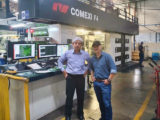Comexi on the no longer relevant pandemic of plastic, Covid19 & the flexible packaging industry
April 1, 2020It seems we are facing once-in-a-generation situation. How are these circumstances really affecting the flexible packaging market and consequently, how is this ultimately shaping the Fast-moving consumer goods sector?
Let’s go through the challenges the industry has been facing lately and what might have in store for the next few months. Let’s not forget though, that the industry is between those considered indispensable during this terrible pandemic and that -thanks to its exceptionality- it is a perfect occasion to dive into the ongoing plastic dilemma through a different perspective.
Until not so long ago the main concern of the biggest FMCG companies in the world was getting rid -whenever possible- of the plastic used to package their products and substitute it for potentially less polluting alternatives. Plastic contamination has been labelled during the 21st century as one of the biggest threats to ever be faced, spreading like a virus through our freshwater streams and oceans.
During this unequal clash between hyperbolic turtle-choking images and scientific studies supporting the use of plastic, we have been stripped out of our rationality when approaching the plastic casuistry. This has led us to a scenario in which, out of our own biased perception, we have -relentlessly- been blaming plastic for our own lack of strategy in the handling of our very own waste.
The below diagram aims to illustrate how a proper evaluation should take place (in red) in comparison to what happens with plastic (in orange) which is -dangerously- happening in the opposite direction. We have already made up our minds that plastic is a bad alternative and we are trying to figure out our way backwards.
This happens -to a great extend- due to the amount of unaccredited sources from which we receive spamming on a daily basis on how much plastic is damaging the environment. The expansion of Covid-19 though, has shaped the environment in a completely different way and has also shifted the balance of priorities in this all-out war against plastic that has been ongoing for the last few years.
Ironically, Brands and Converters are now having more workload than ever and the challenges they are facing are way different from those only a few months ago. People are more even more concerned for the protection of the products they consume, paying special attention to how the products they pick are packaged and protected. Also, the consumption of single-use masks and gloves has sky-rocketed since protection of human welfare is -obviously- the utmost priority.
Let’s not forget though how all this started, since the major suspect of the virus outbreak has been the Pangolin, one of the many animals that are smuggled everyday into continental China to be later processed into -of course- food or medicine. The safety and cleanliness conditions under which these endangered animals are trafficked adds up to their -already dangerous- very nature.
This may seem as something that has very little to do with flexible packaging, right? Well in fact it does. Can you imagine what would happen if we stopped using plastic to protect all the products we consume daily? This will of course not happen, but in case it did it would be an absolute catastrophe.
It is now -more than ever- time to carry out an exhaust analysis as a society on how we should be handling our waste and encourage and empower initiatives -like Ceflex and many others- that are aiming to create a more sustainable economy by improving the recyclability of the materials we use for packaging while ensuring there are reliable recycling methods downstream of the whole process. This is the only way materials will -in fact- be reused.
It will also be a big challenge for all the Brands to move out of the comfort zone in which they are with the current structures to move into more sustainable alternatives. This will be an act of responsibility and commitment towards the society and the environment, trying to stay away from alternatives like paper that -even they are suitable for some low barrier applications- are not the panacea or the Holy Grail that will solve the problem. Can you imagine we substituted all the packaging we use on a daily basis for paper? How many trees would we need to chop off?
Once we have all the pieces of this chess match in place we will be in position to deliver the checkmate to the -ongoing- problem of plastic pollution! Nevertheless, this unprecedented situation has put us in perfect conditions to really put into perspective the benefits of flexible packaging and also how we can improve it so that it brings along even bigger benefits for the society!

